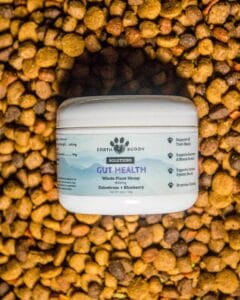Before diving deep into the various sources of protein for dogs, it’s fundamental to grasp the primary role of proteins, more specifically, the amino acids they contain, within a diet. Amino acids, in essence, are the building blocks of proteins.
When dogs consume protein sources, they’re broken down in the gastrointestinal tract into these smaller components for absorption. Of the many amino acids available, dogs specifically need 10 of them, termed “essential” because they must be directly sourced from their diet, primarily through animal protein sources.
The body can then synthesize the remaining non-essential amino acids by using these essential amino acids as a foundation, provided that there’s an adequate supply of the essentials and other necessary cofactors.
Learning About Essential Amino Acids
Among the ten essential amino acids, lysine and methionine warrant particular attention. These two are known as “limiting amino acids,” signifying that they are frequently the ones found to be in short supply in dog foods that are less rich in protein.
When formulating or assessing dog foods, ensuring adequate levels of these amino acids is crucial because, by providing sufficient amounts of amino acids, you are helping keep dogs in peak condition.
Following lysine and methionine, the remaining amino acids include:
- Arginine
- Histidine
- Isoleucine
- Leucine
- Phenylalanine
- Threonine
- Tryptophan
- Valine
Providing your dog with high protein dog food makes it more likely they will check most of these off the list within each meal.
Choosing Proteins with the Highest Biological Value
The term “biological value” refers to the efficiency with which dogs can break down, assimilate, and utilize the protein present in a specific food source. Essentially, it gauges how effectively a dog’s digestive system can convert the protein from food into usable protein in their body.
Foods with a high biological value are deemed premium protein sources for dogs, primarily because they support normal digestive function. Consequently, when a dog consumes these high-biological-value protein sources, it can harness nearly all of the embedded protein, optimizing the available benefits.
Chicken as a Protein for Dogs
Chicken breast is a highly nutritious protein source for dogs, offering a range of essential nutrients. It’s a lean protein that’s high in linoleic acid along with a number of other beneficial nutrients.
Raw chicken meat (without skin) typically contains about 18-25% protein by weight. When cooked, the water content reduces, and the protein concentration becomes higher, often ranging from 25-30% or more.
Chicken is a rich source of several essential vitamins and minerals, including B vitamins, especially niacin (B3) and pyridoxine (B6). These play critical roles in supporting a normal metabolic rate and helping maintain normal nervous system function.
It’s also a good source of phosphorus which is essential for helping build and maintain bones and teeth, as well as playing a role in supporting the normal function and health of the kidneys.
Another critical component of chicken is selenium. Selenium is an essential trace mineral that contains antioxidants to eliminate free radicals and supports the immune system. Chicken also contains zinc which is important for supporting immune system function.
Nutrient Dense Eggs as Protein for Dogs
Chicken eggs are high in fats, so they must be fed sparingly, but they’re a good source of choline. Feeding your dog chicken eggs offers a plethora of nutritional benefits that can significantly contribute to supporting and promoting long-term health. Eggs are a protein powerhouse, often supplying all the essential amino acids dogs require to support normal muscle and nervous systems.
Beyond protein, eggs are rich in essential fatty acids, which support skin health and a healthy coat. They are also packed with an array of vitamins and minerals, including vitamin A, riboflavin, folate, vitamin B12, iron, selenium, and choline, all of which play their own important roles in supporting normal cell function, maintaining ocular health, enhancing brain function, and supporting a normal metabolic rate.
By incorporating chicken eggs into your dog’s diet, you are providing them with a nutrient-dense food that helps maintain physical and mental well-being.
Adding Elk to Dog’s Dry Dog Food
Elk meat stands out as an exceptional source of nutrition for dogs, offering a multitude of benefits. As a lean protein, elk provides essential amino acids that support normal muscle recovery and may help protect the body’s cells and tissues. Rich in omega-3 fatty acids, elk meat promotes healthy skin and a glossy coat.
As far as minerals go, elk is a natural source of zinc, selenium, and iron, which are crucial for supporting a normal metabolic rate and immune system function. These minerals also enhance oxygen utilization which helps support heart function. Choosing elk for your dog not only introduces variety into their diet but also helps ensure they receive a balanced mix of high-quality nutrients essential for their well-being.
Adding Pork Loin to a Balanced Diet
Pork loin is a good source of thiamine and it’s a lean meat. Feeding your dog pork loin can be a healthful addition to their diet, delivering a rich array of nutrients vital for helping keep dogs in peak condition. Pork loin stands out as an excellent source of high-quality protein, essential for helping with muscle function and fluid balance, and helping maintain the general health of all ages and breeds.
Beyond its protein content, pork loin is also a good source of essential vitamins and minerals, including thiamine, niacin, riboflavin, and phosphorus. Thiamine, in particular, is crucial for supporting a normal metabolic rate, while phosphorus promotes normal periodontal health. The essential amino acids found in pork loin support various physiological processes.
Bison as a Lean Protein for Dogs
Feeding your dog bison offers a unique and nutritious alternative to more common meats. Bison is a lean protein source, which means it provides plenty of essential amino acids without the excessive fat content found in some other meats. It’s especially rich in omega-3 fatty acids, which are beneficial for promoting healthy skin and a shiny coat.
Additionally, bison is packed with essential vitamins and minerals, such as iron, zinc, and B vitamins. Iron is vital for supporting oxygen utilization, zinc supports immune system health, and B vitamins aid in supporting energy production.
Plus, bison is typically grass-fed, often making it a more environmentally friendly and sustainable meat choice. Incorporating bison into your dog’s diet can provide diverse nutritional benefits and introduce them to a novel protein source, which can be especially useful for animals with sensitive skin.
Add Small Fresh, Oily Fish to Dog’s Diet
Feeding your dog small fresh oily fish as protein sources, like sardines, mackerel, or anchovies, can be tremendously beneficial promoting and supporting long term health. These fish are notably rich in omega-3 fatty acids, such as EPA and DHA, which are known for enhancing brain function, promoting a normal inflammatory pathway, and a glossy coat and healthy skin. Oily fish are an excellent source of high-quality protein, essential for connective tissue support.
They also provide a bounty of vitamins and minerals, including vitamin D, vitamin B12, and selenium. Vitamin D enhances bone and joint health, while B12 is crucial for supporting normal nerve conduction, and selenium acts as antioxidant protection. As an added bonus, small fish tend to accumulate fewer toxins than larger predatory fish, making them a safer option.
Understanding Digestibility of Protein for Dogs
Certain protein sources are more readily digestible for your dog’s body compared to others. Leading the pack in terms of digestibility are eggs, boasting a near-perfect score of 100%. Following closely are muscle meats like chicken, beef, and lamb, all of which have an impressive digestibility rate of 92%. Organ meats, often considered delicacies in the canine world, such as kidney, heart, and liver, also rank high, with a digestibility rate of around 90%.
Fish, though still a commendable source of protein, sits slightly lower on the digestibility scale at 75%. On the other hand, plant-based proteins tend to be the least digestible for dogs, with their rates varying between 54% to 75%. It’s crucial to recognize these differences when curating a balanced diet for your furry friend, ensuring they get the most out of their meals containing more protein than the average diet.
For improved digestion, consider adding in our Colostrum for dogs as an added protein boost along with balancing the gut microbiome. Earth Buddy Gut Health products for dogs are designed to allow dogs to better absorb nutrients and enhance digestion. It is also a great supplement for dogs with allergies to various foods and can often lessen the digestive reaction when transitioning to new dog food. By sprinkling a small amount of colostrum on your dog’s food daily, you will begin to see better stool quality and improved digestion in your dog through shinier skin & coat and less stinky breath!
Common Questions About Protein for Adult Dogs
The following are commonly asked questions about animal protein sources for dogs:
How much protein should dogs consume?
Before introducing any new dietary elements to your dog’s regimen, it is imperative to consult with a veterinarian for approximately how much protein you should look for in dog foods. As a foundational guideline, many dogs typically require a minimum of 20 grams of protein daily. It’s crucial to recognize that just as human dietary requirements differ, so do those of dogs. Specifically, active dogs often have a heightened need for more protein than the standard guideline suggests.
How much organ meat can be added to your dog’s diet?
Your dog shouldn’t have more than 3-5% organ meat in their diet.
Can the same meat be put on top of the food every day?
It’s not advisable for a dog’s body to rely solely on a single protein source for your pet’s diet. Rotating between different proteins provides a well-rounded nutritional profile, ensuring that your dog gets a diverse range of essential nutrients.
This variation not only helps in covering potential nutritional gaps but also keeps mealtime interesting for your furry companion. Remember, just like humans, dogs can benefit from a varied diet to meet all their health needs.
Does heat affect protein in dog food?
If you’re feeding your dog kibble, it’s advisable to consider adding toppers to their meals. The processing of kibble often involves multiple rounds of heating, sometimes up to six times, which can degrade the proteins present in the food. This heating process can compromise the nutritional integrity of the kibble.
By introducing toppers, you can enhance the overall nutritional content, ensuring your dog receives a more balanced and nutrient-rich diet. Toppers can replenish some of the lost nutrients and provide a fresh taste and texture from high quality protein sources that many dogs appreciate.
Consulting a Professional

Leveraging their deep understanding of canine dietary requirements, they help your dog receive all the essential nutrients, helping maintain optimal health. Engaging with a canine nutritionist provides an assurance that you are offering your pet the best possible nutrition, not feeding them too much protein or not enough, and tailor a diet to their unique needs and life stage
For further reading, we recommend:
- https://www.frontiersin.org/articles/10.3389/fvets.2021.667318/full
- https://www.ncbi.nlm.nih.gov/pmc/articles/PMC9219525/
- https://www.researchgate.net/publication/344151882_Beynen_AC_2020_Protein_supply_to_adult_dogs
- https://pubmed.ncbi.nlm.nih.gov/32806674/
- https://pubmed.ncbi.nlm.nih.gov/36807528/
- https://academic.oup.com/jas/article-abstract/doi/10.1093/jas/skad057/7046367?redirectedFrom=fulltext
- https://www.ncbi.nlm.nih.gov/pmc/articles/PMC6994059/
You Might Also Enjoy
Reactive dog barking may sound intimidating, but it’s important to differentiate it from dog aggression.…
Your dog’s skin is their largest organ making dog skin care a crucial part of…
Like us, our dogs, and other mammalian species, cats have an endocannabinoid system. This system…










